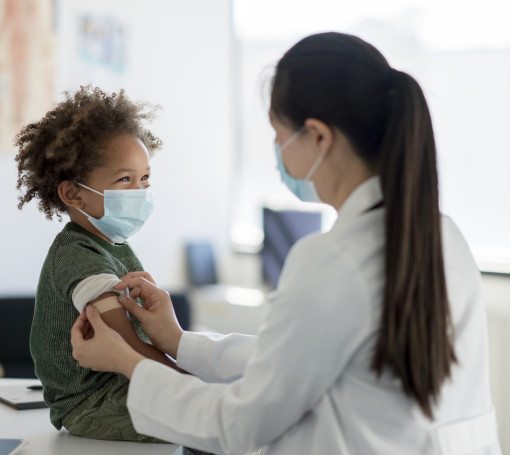As pediatricians, we know you want to keep your newborn safe and healthy. One of the best ways to protect your baby from a serious liver infection called hepatitis B is to give the first vaccine dose right after birth. The Washington State Department of Health, American Academy of Pediatrics, and Western States Healthcare Alliance continue to recommend the hepatitis B vaccine for all newborns, with the first dose given within 24 hours of birth. Allegro Pediatrics remains aligned with this longstanding recommendation, which has been in place since 1991.
Many parents don’t realize their baby could still be at risk for hepatitis B. Even if a mother tests negative during pregnancy, other exposures can occur. Here’s what you should know:
What Is Hepatitis B?
Hepatitis B is a virus that infects the liver. It can cause symptoms like yellowing of the skin (jaundice), tiredness, stomach pain, and dark urine. Over time, it can lead to serious health problems such as liver damage, cirrhosis, or even liver cancer.
There is no cure for chronic hepatitis B. While it can be managed with medicine, 25% of chronically infected children will eventually die from liver disease. That’s why prevention is so important.
Why Are Babies at Higher Risk?
Age makes a big difference when it comes to hepatitis B.
- Adults: Most adults who get hepatitis B will recover completely.
- Infants: 9 out of 10 infants who catch it will develop a lifelong infection.
- Young Children: Children under 5 are also at higher risk. About 3 in 10 can develop serious liver disease later in life.
Because a baby’s immune system is still developing, their bodies can’t easily clear the virus on their own.
What is the history of the hepatitis B vaccine?
Before the hepatitis B vaccine was introduced, hundreds of thousands of Americans were infected each year, including around 20,000 children.
The first vaccine became available in 1981, but early recommendations targeted only babies whose mothers were known to have hepatitis B. Infection rates stayed high.
It wasn’t until 1991, when the Centers for Disease Control and Prevention (CDC) recommended universal vaccination for all newborns, that infections in children dropped by an incredible 99%.
Why do all babies need the birth dose?
You might wonder why we don’t only vaccinate babies whose mothers test positive for hepatitis B. Unfortunately, that approach misses too many infants who are still at risk. Here’s why:
- Some mothers don’t know if they’re infected.
- About 15% of pregnant women in the U.S. don’t receive prenatal care or screening. In many nations with socialized medicine, prenatal care and screening are far more consistent and nearly universal, so far fewer hepatitis B–positive pregnant individuals are missed.
- The hepatitis B test isn’t perfect. It can miss up to 5% of infections.
- Infection can also happen later in pregnancy, after the initial screening.
- Babies can catch hepatitis B from caregivers or family members.
- The virus spreads through contact with infected blood or body fluids, even in tiny, invisible amounts.
- 60% of infected people don’t have symptoms, so many don’t know they carry the virus.
- The virus can survive on surfaces like towels or nail clippers for up to a week.
- Many families rely on relatives or daycare providers to help care for their baby. This increases contact with others who might unknowingly be infected.
Is the Hepatitis B Vaccine Safe?
The hepatitis B vaccine is safe and effective. It has been used for over 40 years and protects nearly everyone who receives it. Serious allergic reactions are extremely rare — about 1 in every 2–3 million doses.
When babies receive the first dose within 12 to 24 hours after birth, followed by the full vaccine series, their risk of infection drops to 0.7%–1.1%.
Additional Information:
Visit the Children’s Hospital of Philadelphia Vaccine Education Center for more information. If you have specific questions about the hepatitis B vaccine, your child’s pediatrician can help explain the schedule, answer concerns, and make sure your baby is protected from the very start.
Keep Reading
View All Posts
Tips for Navigating Flu Season
Getting a flu vaccine is one of the most effective ways to prevent the spread of influenza and reduce the risk of complications.

Measles FAQs
The MMR vaccine is a safe and effective way to protect against measles. Learn answers to commonly asked questions about measles.

Helping Kids Breathe Easier
By checking asthma control at every well care visit, we can identify changes early and make sure each child has the support they need to breathe comfortably and stay active.

